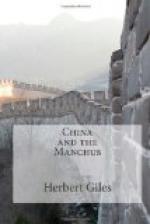violated this contract by dispatching troops, at the
request of the king of Korea, whose throne was threatened
by a serious rebellion, without sufficient warning
to Japan, and further, by keeping a body of these troops
at the Korean capital even when the rebellion was
at an end. A disastrous war ensued. The
Japanese were victorious on land and sea; the Chinese
fleet was destroyed; Port Arthur was taken; and finally,
after surrendering Wei-hai-wei (1895), to which he
had retired with the remnant of his fleet, Admiral
Ting, well known as “a gallant sailor and true
gentleman,” committed suicide together with four
of his captains. Li Hung-chang was then sent
to Japan to sue for peace, and while there he was
shot in the cheek by a fanatical member of the Soshi
class. This act brought him much sympathy—he
was then seventy-two years old; and in the treaty
of Shimonoseki, which he negotiated, better terms perhaps
were obtained than would otherwise have been the case.
The terms granted included the independence of Korea,
for centuries a tribute-paying vassal of China, and
the cession of the island of Formosa. Japan had
occupied the peninsula on which stands the impregnable
fortress of Port Arthur, and had captured the latter
in a few hours; but she was not to be allowed to keep
them. A coalition of European powers, Russia,
Germany, and France—England refused to join—decided
that it would never do to let Japan possess Port Arthur,
and forced her to accept a money payment instead.
So it was restored to China—for the moment;
and at the same time a republic was declared in Formosa;
but of this the Japanese made short work.
[I once read the memoirs of a Japanese foreign minister
from this period. He didn’t think much
of most of the Chinese diplomats, whom he considered
completely untrustworthy.—JB.]
The following year was marked by an unusual display
of initiative on the part of the Emperor, who now
ordered the introduction of railways; but in 1897
complications with foreign powers rather gave a check
to these aspirations. Two German Catholic priests
were murdered, and as a punitive measure Germany seized
Kiaochow in Shantung; while in 1898 Russia “leased”
Port Arthur, and as a counterblast, England thought
it advisable to “lease” Wei-hai-wai.
So soon as the Manchu court had recovered from the
shock of these events, and had resumed its normal
state of torpor, it was rudely shaken from within by
a series of edicts which peremptorily commanded certain
reforms of a most far-reaching description. For
instance, the great public examinations, which had
been conducted on much the same system for seven or
eight centuries past, were to be modified by the introduction
of subjects suggested by recent intercourse with Western
nations. There was to be a university in Peking,
and the temples, which cover the empire in all directions,
were to be closed to religious services and opened
for educational purposes. The Manchus, indeed,
have never shown any signs of a religious temperament.




